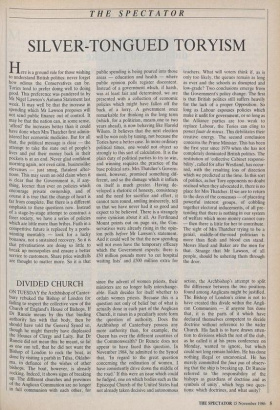THE SPECTATOR
SILVER—TONGUED TORYISM
Here is azround rule for those wishing to understand British politics: never forget how odious the Conservatives can be. Tories tend to prefer doing well to doing good. This preference was pandered to by Mr Nigel Lawson's Autumn Statement last week. It may well be that the increase in spending which Mr Lawson proposes will not send public finance out of control. It may be that the nation can, in some sense; `afford' the increases better than it could have done when Mrs Thatcher first admin- istered her economic medicine. But for all that, the political message is clear — the attempt to take the state out of people's lives and put their money back in their pockets is at an end. Never glad confident morning again, nor even calm, businesslike elevenses .— just smug, flatulent after- noon. This may seem an odd claim when it is. clear that the Government is, if any- thing, keener than ever on policies which encourage private ownership, and of course it is true that the change of heart is far from complete. But there is a different emphasis to these qnestions now. Instead of a stage-by-stage attempt to construct a freer society, we have a series of policies which are little more than bribes. Faith in a competitive future is replaced by a pools- winning mentality — look for a lucky bonanza, not a sustained recovery. So it is that privatisations are doing so little to break up monopolies and ensure a better service to customers. Share price windfalls are thought to matter more. So it is that public spending is being poured into those areas — education and health — where public opinion polls register discontent. Instead of a government which, if harsh, was at least fair and determined, we are presented with a collection of economic policies which might have fallen off the back of a lorry. A government once remarkable for thinking in the long term (which, for a politician, means one to two years ahead), is now behaving like Harold Wilson. It believes that the next election will be won only by timing, not because the Tories have a better case. In more ordinary political times, one would not object so strongly to this sort of calculation. It is the plain duty of political parties to try to win, and winning requires the practice of the base pOlitical arts. Mrs Thatcher's Govern- ment, however, promised something dif- ferent, and so the damage which it inflicts on itself is much greater. Having de- veloped a rhetoric of honesty, consistency and the need for sacrifice and effort, it cannot turn round, smiling insincerely, tell us that we have never had it so good and expect to be believed.There is a strangely naive cynicism about it all. As Ferdinand Mount points out on page six, the Con- servatives were already rising in the opin- ion polls before Mr Lawson's statement. And it could well be that the new spending will not even have the temporary efficacy which the Government expects: there is £50 million pounds more 'to cut hospital waiting lists' and £500 million extra for teachers. What will voters think if, as is only too likely, the queues remain as long as ever and the schools as disrupted and low-grade? Two conclusions emerge from the Government's policy change. The first is that British politics still suffers heavily for the lack of a proper Opposition. So long as Labour espouses policies which make it unfit for government, or so long as the Alliance parties are too weak to replace Labour, the Tories can cling to power faute de mieux. This debilitates their creative energy. The second conclusion concerns the Prime Minister. This has been the first year since 1979 when she has not completely dominated British politics. The restitution of 'collective Cabinet responsi- bility', called for after Westland, has occur- red, with the resulting loss of direction which we predicted at the time. In this sort of politics, as her Tory opponents no doubt realised when they advocated it, there is no place for Mrs Thatcher. If we are to return to the clays of the consensus — of placating powerful interest groups, of cobbling together electoral inducements, of all pre- tending that there is nothing in our system of welfare which more money cannot cure — then there is little for her to contribute. The sight of Mrs Thatcher trying to be a genial, middle-of-the-road politician is more than flesh and blood can stand. Messrs Hurd and Baker are the men for that. Strange that Mr Lawson, of all people, should be ushering them through the door.


































































 Previous page
Previous page